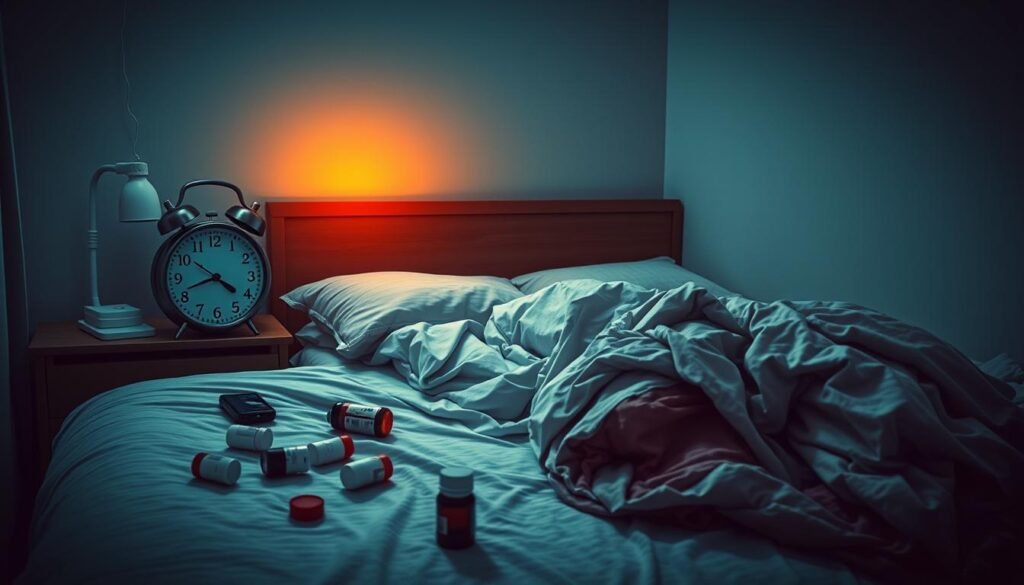Did you know insomnia causes over 5.5 million visits to family doctors each year in the U.S.? This big number shows how common insomnia is, as it affects more than 30% of adults. An effective insomnia treatment algorithm is crucial. It uses a step-by-step method to make sleep better by focusing on why people can’t sleep well.
Insomnia has many sides to it. People’s symptoms often get worse because of health issues, life choices, and certain drugs. Doctors need to look closely at each case. This helps them pick the best way to treat it. If you want to learn more about insomnia and how to treat it, check out this informative article.
Key Takeaways
- Insomnia affects over 30% of adults in the U.S., leading to millions of doctor visits every year.
- Women get insomnia twice as much as men, especially during big hormone changes.
- A step-by-step approach is key to getting better sleep with insomnia.
- Insomnia comes from many sources, so treatment needs to cover all bases.
- The best first choice for treating chronic insomnia is cognitive behavioral therapy.
- It’s best to use meds carefully to avoid becoming dependent or having bad reactions.
Understanding Insomnia and Its Impact on Health
Insomnia affects a lot of people from all walks of life. It’s important to learn what insomnia is, how common it is, and its effects on health. By understanding these factors, we can better tackle insomnia.
What is Insomnia?
Insomnia means having trouble starting or staying asleep even when you have the chance to rest. People with insomnia can’t get the restful sleep they need. This issue hurts their well-being and life quality.
The Prevalence of Insomnia in the U.S.
About 10% of U.S. adults deal with chronic insomnia. Meanwhile, up to one-third face insomnia at one time or another. It’s more common in women and the elderly. Factors like health problems and stress play a role.
Effects of Insomnia on Physical and Mental Health
Insomnia’s impact on health is big and complex. Lack of sleep can lead to mental health issues like depression and anxiety. It also increases the risk of physical problems, such as high blood pressure and diabetes. People with insomnia often view their health negatively.
Insomnia is widespread, with serious effects on health, making accurate diagnosis and treatment essential. For more on insomnia and how to manage it, check resources like the American Academy of Sleep Medicine.
Causes of Insomnia: Factors to Consider
Knowing why you can’t sleep is key to fixing the issue. There are many reasons why people suffer from insomnia. These include health problems and mental health issues.
Understanding these reasons can lead to better sleep solutions.
Medical Conditions Related to Sleep Disorders
Some health issues can cause trouble sleeping. For example:
- Sleep-disordered breathing, like sleep apnea, messes with sleep.
- Chronic pain makes it hard to get comfortable.
- Endocrine disorders, especially diabetes, can ruin sleep quality.
- Cancer treatments often have sleep-stealing side effects.
- Cardiovascular diseases, they lead to anxiety and discomfort at night.
Psychiatric Disorders and Insomnia
Mental health issues can also disturb sleep. Examples include:
- Depression, changing how you sleep.
- Anxiety, filled with thoughts that keep you up.
- Post-traumatic stress disorder (PTSD), comes with nightmares and restlessness.
The Role of Medications in Sleep Disturbances
Some meds can mess with your sleep. This includes:
- Stimulants found in ADHD treatments.
- Antidepressants may lead to sleepless nights for some.
- Over-the-counter remedies, like those with caffeine or nicotine.

Finding out what causes your insomnia is the first step to getting better. It leads to treatment plans that really work.
Diagnosis and Evaluation of Insomnia
Diagnosing insomnia is crucial for effective treatment. A doctor will start with a medical history and a physical check. This helps find the factors causing the sleep problem. Identifying the root causes is key to find the right treatment.
Physical Exam and Medical History
A detailed medical history can reveal a lot about sleep issues. Doctors might ask for a sleep diary. This diary tracks sleep patterns and how they affect the day. It’s vital for figuring out insomnia.
A physical exam might show medical issues affecting sleep. Learning about the patient’s sleep environment and stressors helps understand insomnia causes.
Sleep Studies and Monitoring Techniques
If the first checks don’t explain the sleep issues, advanced methods might be needed. Sleep studies for insomnia, like polysomnography, look closely at sleep stages. They help spot other sleep disorders along with insomnia.
These studies monitor brain activity, heart rate, and breathing during sleep. This detailed information guides doctors to better treatment options.

Insomnia Treatment Algorithm: A Structured Approach
The insomnia treatment algorithm offers a clear path for treating sleep issues. It focuses on care tailored to each person. At the start, doctors often recommend treatments that don’t involve drugs. They look at specific therapies before thinking about medication.
Non-Pharmacologic Treatments as First-Line Options
Non-drug treatments are highly effective for better sleep. Techniques like Cognitive Behavioral Therapy for Insomnia (CBT-I) help tackle the thoughts and behaviors causing sleep problems. Adding methods like controlling stimuli, limiting sleep time, and relaxation can boost these efforts. These strategies enhance sleep routines while cutting down on the need for drugs and their possible side effects.
When to Consider Prescription Medications
If non-drug methods fall short, doctors might suggest medicine for insomnia. The first choice often includes non-benzodiazepine hypnotics. Should these not work, benzodiazepines could be the next step, chosen based on the patient’s health history and how they sleep. This careful treatment plan aims to improve sleep and overall health, respecting each patient’s needs.

Effective Behavioral Strategies for Insomnia
Behavioral strategies play a crucial role in treating insomnia. Cognitive Behavioral Therapy for Insomnia (CBT-I) is a key method that improves sleep quality. It shows that many people get better with CBT-I. This method helps by changing negative thoughts and behaviors that hurt sleep. It encourages good sleep habits.
Cognitive Behavioral Therapy for Insomnia (CBT-I)
CBT-I works well for both short-term and long-lasting insomnia. It includes strategies like cognitive restructuring. This changes wrong or unhelpful thoughts about sleep. Addressing these thoughts can lead to better sleep. Studies prove that 70% to 80% of patients with primary insomnia see benefits from this approach. This shows its importance.
Stimulus Control and Sleep Restriction Techniques
Stimulus control techniques make the bedroom a place for sleep only. They help create a steady sleep-wake cycle. Sleep restriction therapy increases the need to sleep by limiting time in bed. This may cause tiredness at first but improves sleep drive later. Sleep compression, a milder approach, benefits older people. This makes it adaptable.
Relaxation Techniques to Enhance Sleep Quality
Relaxation techniques are key to achieving better sleep. They handle racing thoughts and tension. Breathing exercises and progressive muscle relaxation bring calmness. They also help fall and stay asleep. Combined with CBT for insomnia, these practices offer a full approach to sleep issues. For more information on how these strategies help, read here.
Pharmacological Treatment Options for Insomnia
Various treatments are key in managing insomnia. Knowing the pros and cons of drugs can make a big difference in treatment. This covers important meds like benzodiazepines and melatonin agonists, and what to consider when using them.
Common Medications: Benzodiazepines and Z-Drugs
Since the 1960s, benzodiazepines have been used to treat insomnia. Drugs such as triazolam and temazepam reduce the time it takes to fall asleep. Studies show they also help people sleep longer. However, there are risks like tolerance and daytime drowsiness to watch out for.
Z-drugs like zolpidem have become popular recently. They are similar to benzodiazepines but may have fewer side effects. These meds can be effective for a few months, helping with both falling asleep and staying asleep.
Melatonin Agonists and Their Effects
Melatonin has become a preferred option for safer treatment. Melatonin agonists, such as Ramelteon, mimic our natural hormone to regulate sleep. This makes them an attractive choice for those looking for gentler treatments.
Cautions and Risks Associated with Sleep Medications
Although sleep meds can help, being cautious is important. For example, avoid alcohol with sedatives and follow the prescription carefully. People with a history of addiction or certain sleep conditions need to be careful. It’s also wise to regularly check with a doctor when using sleep meds long-term, to ensure they’re still the right choice and not causing harm.
| Medication Class | Examples | Common Uses | Risks |
|---|---|---|---|
| Benzodiazepines | Triazolam, Estazolam, Temazepam | Reduced sleep latency, total sleep duration | Dependency, next-morning impairments |
| Z-Drugs | Zolpidem, Eszopiclone | Sleep-onset and sleep-maintenance insomnia | Potential for tolerance |
| Melatonin Agonists | Ramelteon | Regulating the sleep-wake cycle | Generally fewer side effects |
Natural Remedies for Sleep Issues
Many people look for different ways to get better sleep. They try natural solutions to fight insomnia. This refreshing approach can help with sleep-related problems.
Herbal Supplements and Their Effectiveness
Herbal supplements are becoming popular for helping with sleep. Valerian root and chamomile are two common types. These herbs can calm nerves and help fight anxiety. This makes it easier to fall asleep. Although some studies show their benefits, more research is needed. Yet, their gentle effects make them a good choice for those avoiding medications. You can learn more about these natural remedies and their uses.
Lifestyle Changes to Promote Better Sleep
Making lifestyle changes can improve your sleep. It’s essential to have a regular sleep schedule and a calming bedroom environment. Avoiding screens before bed is also important. Cutting down on caffeine before sleep helps too. Combining these habits with herbal supplements can create a new way to fight insomnia. This way, you don’t have to use only medication.
Best Practices for a Healthy Sleep Routine
Getting good restorative sleep starts with a solid routine. First, the environment where you sleep is key. Things like room temperature, light, and noise levels all affect how well you sleep. Choosing the right mattress and bedding also adds to your comfort and helps you relax.
Creating an Ideal Sleep Environment
For better sleep, pay attention to your bedroom’s setting. A dark, quiet, and cool room helps you sleep better. Keep electronics out of the bedroom for a more calming atmosphere. Using blackout curtains or sound machines can also create the right environment for rest. For more tips, visit creating sleep environment.
Establishing Consistent Sleep Patterns
Sticking to a regular sleep schedule is also key for good rest. Going to bed and waking up at the same times every day helps set your body’s internal clock. Sleep experts suggest adults should get at least seven hours of sleep. Keeping a schedule not only betters sleep quality but also boosts overall health. Try to avoid stimulants before bed and limit long naps during the day for better sleep patterns.
Relaxing activities before bed, like reading or relaxation exercises, help ease you into sleep. Exercising during the day can improve how well you sleep too. Adding these habits to your daily routine lays the groundwork for better health.
| Practice | Benefit | Notes |
|---|---|---|
| Maintain a Sleep Schedule | Supports circadian rhythms | Consistency is key |
| Create a Comfortable Sleep Environment | Enhances sleep quality | Consider temperature and noise control |
| Limit Evening Stimulants | Facilitates relaxation | Avoid caffeine and heavy meals |
| Engage in Relaxation Techniques | Reduces anxiety | Try meditation or gentle yoga |
Conclusion
In conclusion, treating insomnia needs a step-by-step method. This helps enhance sleep health and general well-being. Understanding its effects on body and mind lets doctors come up with personalized plans. These plans focus on the patient’s specific needs. They find and tackle the reasons behind insomnia. This includes health and emotional issues. Both behavior changes and medications are used for treatment.
Lifestyle shifts and improving sleep practices are key to getting better. These methods help people develop good sleep habits. This not only boosts sleep quality but overall health too. It’s crucial for those with insomnia to talk openly with their doctors. This ensures they get detailed care for their sleep problems.
About 10% of adults suffer from insomnia. It can greatly affect one’s health. Hence, using a thorough treatment plan is crucial. This plan gives people a way to achieve better sleep. It leads to a healthier lifestyle for the future.